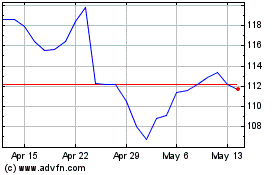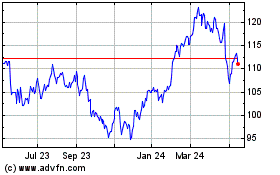Amtrak is naming Norfolk Southern Corp. veteran Charles "Wick"
Moorman as its next chief executive as the national passenger
railroad confronts big projects amid growing demand.
Mr. Moorman will succeed Joe Boardman, who is due to retire this
fall as president and chief executive officer, a post he has held
for eight years.
Mr. Moorman, who served as Norfolk Southern's chairman and CEO
before retiring last year, is expected to serve as a "transitional"
leader of the passenger railroad, Amtrak Chairman Anthony Coscia
said. Amtrak didn't immediately make Mr. Moorman available for
comment on Friday.
Mr. Coscia praised Mr. Moorman's record on financial
performance, customer service and safety—skills he said would help
the railroad reduce operational losses, expand service and improve
reliability to meet growing demand.
"Amtrak is a company that spent decades just surviving," Mr.
Coscia said. "We have moved out of that period, thankfully, and
we've moved into a period where there is tremendous opportunity for
us to make this a viable part of the country's transportation
system."
Mr. Moorman is expected to start on Sept. 1, earning a salary of
$1 a year, with an annual bonus of $500,000 tied to performance
goals, Mr. Coscia said.
Mr. Moorman will take over Amtrak as it embarks on what
transportation officials say is the largest public works project in
the U.S. once it gets under way: the construction of two new Hudson
River rail tunnels connecting northern New Jersey and
Manhattan.
Amtrak's leaders have tried to reduce the taxpayer-funded
railroad's reliance on public subsidies amid pressure from Congress
and generally increasing ridership, particularly on its heavily
traveled Northeast Corridor service between Washington, D.C., and
Boston.
To increase the railroad's reliability, Amtrak has quarreled
with freight railroads over regulations that give the passenger
railroad "preference" to go first on those carriers' rail networks
around the country.
But Mr. Coscia said he hoped Mr. Moorman would improve the
railroad's relationship with freight carriers, which own the tracks
that carry Amtrak passengers nationwide. Amtrak owns much of its
network in the Northeast.
"He clearly understands both worlds, and he's going to be in a
position to try to get us all to a much better place," Mr. Coscia
said of Mr. Moorman.
Amtrak has suffered a series of safety lapses in recent years.
Among the most tragic came in May 2015, when a New York-bound train
derailed in Philadelphia as it sped through a tight curve, killing
eight passengers.
More recently, in April, two of its own workers were struck and
killed on the tracks near Chester, Pa. An investigation indicated
the workers didn't deploy a basic safety device that experts say
would have stopped the train.
The incident also highlighted a rift between Amtrak management
and a key union representing workers who maintain the railroad's
tracks.
Mr. Boardman, who is expected to leave Amtrak at the end of
September, has led the railroad since November 2008. He previously
held the top posts at the Federal Railroad Administration and New
York's Department of Transportation.
Mr. Moorman, who joined Norfolk Southern's predecessor in 1970
and took the helm in 2006, was considered one of the great railroad
CEOs and an operational expert thanks to his years of experience at
the company. He led Norfolk Southern through a period of rapid
growth into 2014, as crude-by-rail and the transportation of cargo
traditionally carried by truck increasingly moved to the
tracks.
At the time Mr. Moorman stepped down as Norfolk Southern CEO in
mid-2015, that major freight rail boom was winding down and volumes
were starting to fall. The railroad was struggling to figure out
efficiency as traffic fell that year and reported the worst
operating ratio, a key profitability metric, of the major North
American railroads in the second quarter of 2015.
That gave fuel to Canadian Pacific's attempt at acquiring its
U.S. neighbor late last year, as executives there touted a plan to
streamline and improve operating efficiencies for the combined
railroads.
Current Norfolk Southern CEO Jim Squires outlined an aggressive
plan to cut costs and improve efficiency, and Canadian Pacific
eventually dropped its bid.
Write to Andrew Tangel at Andrew.Tangel@wsj.com and Laura
Stevens at laura.stevens@wsj.com
(END) Dow Jones Newswires
August 19, 2016 13:05 ET (17:05 GMT)
Copyright (c) 2016 Dow Jones & Company, Inc.
Canadian Pacific Kansas ... (TSX:CP)
Historical Stock Chart
From Mar 2024 to Apr 2024

Canadian Pacific Kansas ... (TSX:CP)
Historical Stock Chart
From Apr 2023 to Apr 2024
